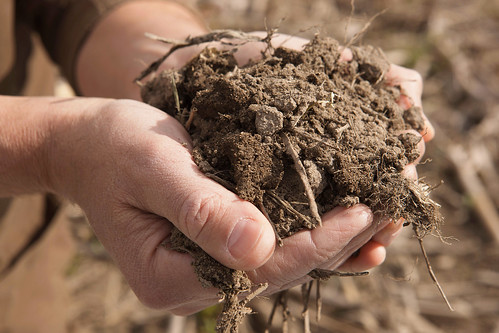
Though remarkably thin, soil makes up a layer of the Earth’s crust that’s vital to human survival. The soil is a living, breathing thing that, like the body’s skin, requires care and attention lest we lose its many benefits.
Ensuring that the Earth’s skin of soil can meet the food, fiber and fuel needs of a world expected to support more than 9 billion people by 2050 is a central focus of USDA’s Agricultural Research Service (ARS).
The agency’s approach is both multi-faceted and cross-cutting. It includes a number of unique research efforts aimed at maintaining and improving the Earth’s “soil and air.”
ARS scientists focus on producing better measurements, computer modeling and cropping systems to minimize the escape of carbon (a greenhouse gas) from soil. Increasing carbon in soil helps retain moisture and makes water and nutrients more readily available to growing plants.
ARS’s research efforts provide a better understanding of extreme weather events like heavy rainfall using strip tillage, cover crops and other management practices that help maintain soil health and protect soils from erosion.
ARS scientists are also studying nutrients, both inorganic (such as fertilizers) and organic (such as manure or compost). This effort includes mobile systems such as MAPHEX, which concentrates dairy manure into dried forms that are easier to transport and use. Reducing nutrient losses can save money, increase yield, and help maintain a healthy environment.
ARS scientists are providing better management tools like the mobile phone app LandPKS, which helps producers customize their land-use practices, the Cover Crop Chart, and APLE, a user-friendly spreadsheet to predict phosphorus losses. These tools help farmers better manage soil health and productivity.
Also available for better management of soil moisture are computer models like ALEXI and regional-scale maps through USDA’s Regional Climate Hubs.
In recognition of the global importance of healthy, sustainable soils, ARS scientists also conduct research overseas to address food security issues of concern – like field testing LandPKS in Africa and participating in projects that support the United States Agency for International Development’s Feed the Future initiative.
“Maintaining healthy, resilient and productive soils will help us make sure we can feed this and future generations,” notes ARS National Program Leader Marlen Eve. “ARS scientists are hard at work to provide the information, tools and technologies that farmers need to keep their soils healthy.”



